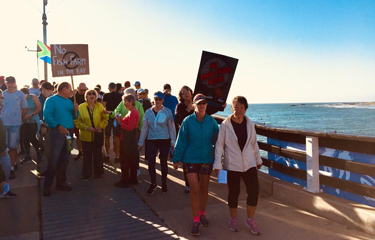South Africa’s Department of Agriculture, Forestry, and Fisheries (DAFF) is proceeding with the establishment of a sea-based aquaculture development zone (ADZ) in the Algoa Bay after revising the initial project plan.
Stakeholders have now been asked to submit their feedback to the draft basic assessment report on DAFF’s revised second and final application for environmental authorization for the development of the ADZ that entails establishment of two oyster and mussel farms in addition to a fish farm at different locations named Algoa 1, Algoa 6, and Algoa 7; all within the Algoa Bay in Port Elizabeth.
Members of the public have up to 28 August this year to give their feedback on DAFF’s application, according to a July 2019 draft basic assessment report by a consultant, Anchor Research and Monitoring, on the Algoa Bay Sea-Based Aquaculture Development Zone for DAFF.
Plans to develop a sea-based aquaculture development zone in South Africa’s Eastern Cape, where Algoa Bay is located, were first introduced in 2009 when a government strategic environmental assessment of the country’s coastline found the region suitable for establishment of aquaculture farms.
In 2011, DAFF applied for the development a sea-based ADZ for the farming of finfish in Algoa Bay, Port Elizabeth and was granted an environmental authorization in July 2014, attracting 28 substantive appeals against the application.
But in August 2015, South Africa’s Department of Environment recalled the publicized application by DAFF “for consideration.”
“During the appeal process, it became evident that the appellants were not opposed to aquaculture development in the provinces, but that they opposed the development at its present location, which is approximately two kilometers offshore from the popular tourist beach area in Port Elizabeth,” said then-Environment Minister Edna Molewa (now deceased).
“Parties consulted had requested that the applicant (DAFF) consider an alternative site for the proposed project,” she said.
However, in 2016, DAFF commissioned three comprehensive assessments of the proposed aquaculture projects and revised the earlier proposal, which led to the elimination of one of the previously suggested site at the Algoa Bay, known as Algoa 5, after the department found the area “has sub-optimal conditions for economic aquaculture and mitigation measures would be impractical or uneconomic to implement and is also located at the center of Addo Marine Protected Area.”
Initially, DAFF wanted to establish a finfish farm at Algoa 1, but it has since revised the plan for the location and now prefers a bivalve culture (specifically, oyster or mussel farming) after concerns emerged the area constitutes a “main area where water-sports events and activities take place” and could jeopardize economy of Port Elizabeth. A second bivalve culture project has been proposed at Algoa 6.
The finfish farm project has now been shifted to Algoa 7, which is directly in front of the Ngqura harbor, where there is adequate water depth and shipping traffic to support its establishment.
But last month, protests were organized by environmental groups including the Wildlife and Environment Society of South Africa (WESSA) to reject the proposed aquaculture projects, despite revision of the initial investment plan by DAFF. The group is pushing for the restoration of the polluated Swartkops Estuary, also in Port Elizabeth.
“Our goal is to draw the public’s attention to the proposed DAFF Algoa Bay aquaculture development zone [and] the shortcomings in the current basic assessment process being undertaken by the environmental assessment practitioner, and to put on record that restoring the Swartkops Estuary is a far more viable and beneficial alternative to the ADZ,” Gary Koekemoer, chairperson of the Algoa Bay branch of WESSA, told News 24.
“In short – no to fish farms, and yes to restoring the Swartkops,” Koekemoer said.
Koekemoer said despite DAFF’s move to relocate the commercial finfish farm to the Port of Ngqura, WESSA remains opposed to its construction.
“We remain concerned about the impact that it could still have,” he said. “While an oyster or mussel farm will have some impact, it will be nothing near to the repercussions that would have been caused by a fish farm.”
DAFF has previously set up a sea-based ADZ at Saldanha Bay in Western Cape and has received environmental authorization for a land-based ADZ in Eastern Cape at Qolora.
Photo courtesy of Pro Dive







